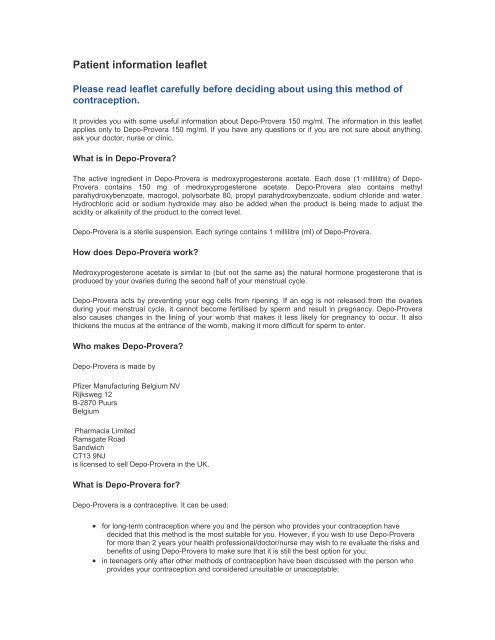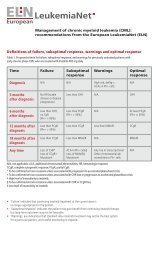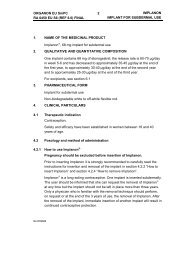Patient information leaflet - epgonline.org
Patient information leaflet - epgonline.org
Patient information leaflet - epgonline.org
You also want an ePaper? Increase the reach of your titles
YUMPU automatically turns print PDFs into web optimized ePapers that Google loves.
<strong>Patient</strong> <strong>information</strong> <strong>leaflet</strong><br />
Please read <strong>leaflet</strong> carefully before deciding about using this method of<br />
contraception.<br />
It provides you with some useful <strong>information</strong> about Depo-Provera 150 mg/ml. The <strong>information</strong> in this <strong>leaflet</strong><br />
applies only to Depo-Provera 150 mg/ml. If you have any questions or if you are not sure about anything,<br />
ask your doctor, nurse or clinic.<br />
What is in Depo-Provera?<br />
The active ingredient in Depo-Provera is medroxyprogesterone acetate. Each dose (1 millilitre) of Depo-<br />
Provera contains 150 mg of medroxyprogesterone acetate. Depo-Provera also contains methyl<br />
parahydroxybenzoate, macrogol, polysorbate 80, propyl parahydroxybenzoate, sodium chloride and water.<br />
Hydrochloric acid or sodium hydroxide may also be added when the product is being made to adjust the<br />
acidity or alkalinity of the product to the correct level.<br />
Depo-Provera is a sterile suspension. Each syringe contains 1 millilitre (ml) of Depo-Provera.<br />
How does Depo-Provera work?<br />
Medroxyprogesterone acetate is similar to (but not the same as) the natural hormone progesterone that is<br />
produced by your ovaries during the second half of your menstrual cycle.<br />
Depo-Provera acts by preventing your egg cells from ripening. If an egg is not released from the ovaries<br />
during your menstrual cycle, it cannot become fertilised by sperm and result in pregnancy. Depo-Provera<br />
also causes changes in the lining of your womb that makes it less likely for pregnancy to occur. It also<br />
thickens the mucus at the entrance of the womb, making it more difficult for sperm to enter.<br />
Who makes Depo-Provera?<br />
Depo-Provera is made by<br />
Pfizer Manufacturing Belgium NV<br />
Rijksweg 12<br />
B-2870 Puurs<br />
Belgium<br />
Pharmacia Limited<br />
Ramsgate Road<br />
Sandwich<br />
CT13 9NJ<br />
is licensed to sell Depo-Provera in the UK.<br />
What is Depo-Provera for?<br />
Depo-Provera is a contraceptive. It can be used:<br />
• for long-term contraception where you and the person who provides your contraception have<br />
decided that this method is the most suitable for you. However, if you wish to use Depo-Provera<br />
for more than 2 years your health professional/doctor/nurse may wish to re evaluate the risks and<br />
benefits of using Depo-Provera to make sure that it is still the best option for you;<br />
• in teenagers only after other methods of contraception have been discussed with the person who<br />
provides your contraception and considered unsuitable or unacceptable;
• for just one or two occasions in the following cases:<br />
o (i) if your partner is undergoing vasectomy, to give you protection until the<br />
vasectomy becomes effective;<br />
o (ii) if you are being immunised against rubella, to prevent pregnancy<br />
during the period of activity of the virus.<br />
o (iii) if you are awaiting sterilisation.<br />
Will Depo-Provera suit you?<br />
Most women who use Depo-Provera find this method of contraception to be fully acceptable, however, not<br />
all women should use Depo-Provera.<br />
You should not use Depo-Provera for contraception if you have any of the following conditions:<br />
• if you have had cancer of the breast or sex <strong>org</strong>ans;<br />
• if you have unusual vaginal bleeding the cause of which is unknown;<br />
• if you are allergic to medroxyprogesterone acetate or any of the other ingredients of Depo-Provera;<br />
• if you think you may be pregnant;<br />
• if you have not started getting your periods;<br />
• if you are using certain medicines such as high dose glucocorticoids (steroids), anti-epileptics, and<br />
thyroid hormones. Tell the person who provides your contraception if you are taking these or any<br />
other medicines - they may recommend a more suitable method of contraception.<br />
Things to consider before choosing Depo-Provera<br />
Before your doctor prescribes Depo-Provera, you will have a physical examination. It is important to tell your<br />
doctor if you have, or have had in the past, any of the following conditions. Your doctor will then discuss with<br />
you whether Depo-Provera is suitable for you.<br />
• migraine headaches;<br />
• diabetes or a family history of diabetes;<br />
• severe pain or swelling in the calf (indicating a possible clot in the leg, which may be called<br />
phlebitis);<br />
• past pulmonary embolism or stroke while using Depo-Provera;<br />
• problems with your eyesight while using Depo-Provera;<br />
• past history of depression;<br />
• problems with your liver or liver disease;<br />
• history of heart disease or cholesterol problems including any family history;<br />
• if you have recently had a ’hydatidiform mole’ which is a type of abnormal pregnancy;<br />
Depo-Provera usually disturbs the pattern of women’s periods.<br />
After the first injection it is most likely that you will have irregular, possibly lengthy bleeding or spotting. This<br />
continues in some women. This is quite normal and nothing to worry about.<br />
One third of women will not have any bleeding at all after the first injection. After 4 injections, most women<br />
find that their periods have stopped completely. Not having periods is nothing to worry about.<br />
If you experience very heavy or prolonged bleeding you should talk to your doctor. This happens rarely but<br />
can be treated easily.
When you stop using Depo-Provera your periods will return to normal in a few months.<br />
What if I want a baby?<br />
Your usual level of fertility will return when the effect of the injection has worn off. This takes different times<br />
in different women, and does not depend on how long you have been using Depo-Provera. In most women<br />
the effect will have worn off 5 to 6 months after the last injection. Over 80 % of women will conceive within a<br />
year of the first missed injection.<br />
Pregnancies have been recorded in the first month after missing an injection.<br />
Will I put on weight?<br />
Some women gained weight while using Depo-Provera. Studies show that over the first 1-2 years of use, the<br />
average weight gain was 5-8 lbs. Women completing 4-6 years of therapy gained an average of 14-16.5 lbs.<br />
What about cancer risks?<br />
Studies of women who have used different forms of contraception found that women who used Depo-<br />
Provera for contraception had no increased overall risk of developing cancer of the ovary, womb, cervix, or<br />
liver.<br />
Every woman is at risk of breast cancer whether or not she receives injections of medicines like Depo-<br />
Provera. Breast cancer is rare under 40 years of age, but the risk increases as a woman becomes older.<br />
There seems to be a slightly increased risk of breast cancer in women who take injectable contraceptives<br />
compared to women of the same age who do not use hormonal contraceptives.<br />
This small extra risk of developing breast cancer has to be weighed against the known benefits of medicines<br />
like Depo-Provera. It is not certain whether the injection causes the increased risk of breast cancer. It may<br />
be that women receiving the injection are examined more often, so that breast cancer is noticed earlier. The<br />
breast cancer seems less likely to have spread when found in women who receive medicines like Depo-<br />
Provera than in women who do not.<br />
The risk of finding breast cancer is not affected by how long a woman is on the injection, but by the age at<br />
which she stops. This is because the risk of breast cancer strongly increases as a woman becomes older.<br />
Ten years after stopping hormonal contraceptive injections, the risk of finding breast cancer is the same as<br />
for women who have never used hormonal contraceptives.<br />
In 10, 000 women who receive injections like Depo-Provera for up to 5 years, but stop taking it by the time<br />
they are aged 20, it is estimated that less than 1 additional case of breast cancer would be found up to 10<br />
years afterwards, compared with the number found in 10,000 women who had never had the injection.<br />
For 10, 000 women who are on injections like Depo-Provera for 5 years and stop it by the age of 30, there<br />
would be 2 or 3 extra cases of breast cancer found up to 10 years afterwards (in addition to the 44 cases of<br />
breast cancer found in 10,000 women in this age group who had never had the injection).<br />
For 10, 000 women who take Depo-Provera for 5 years and stop it by the age of 40, there would be about<br />
10 extra cases found up to 10 years afterwards (in addition to 160 cases of breast cancer found in 10,000<br />
women in this age group who had never had the injection).<br />
Will Depo-Provera affect my bones?<br />
Depo-Provera works by lowering levels of oestrogen and other hormones. However, low oestrogen levels<br />
can cause bones to become thinner (by reducing bone mineral density). Women who use Depo-Provera<br />
tend to have lower bone mineral density than women of the same age who have never used it. The effects
of Depo-Provera are greatest in the first 2-3 years of use. Following this, bone mineral density tends to<br />
stabilise and there appears to be some recovery when Depo-Provera is stopped. Research is being carried<br />
out to find out how completely the bones recover after long-term use of Depo-Provera. It is not yet known<br />
whether the effect of Depo-Provera on bone mineral density increases the risk of osteoporosis (weak bones)<br />
and fractures in later life.<br />
Teenagers (up to 18 years): Normally, the bones of teenagers are rapidly growing and increasing in<br />
strength. The stronger the bones are when adulthood is reached, the greater the protection against<br />
osteoporosis in later life. Since Depo-Provera may cause teenage bones to become thinner at a time when<br />
they should be growing, its effect may be particularly important in this age group. Bones start to recover<br />
when Depo-Provera is stopped, but it is not yet known whether the bone mineral density reaches the same<br />
levels as it would have if Depo-Provera had never been used. You should therefore discuss whether another<br />
form of contraception might be more suitable for you with the person who provides your contraception before<br />
starting Depo-Provera.<br />
If you use Depo-Provera, it may help your bones if you take regular weight-bearing exercise and have a<br />
healthy diet, including an adequate intake of calcium (e.g. in dairy products) and vitamin D (e.g. in oily fish).<br />
Is there a risk of infection at the injection site?<br />
As with any intramuscular injection, there is a risk of an infection at the site of injection. This may require<br />
medical or surgical attention.<br />
Could I be allergic to Depo-Provera?<br />
There is a very low risk of severe allergic reactions.<br />
Taking other medicines<br />
Tell your doctor if you are taking aminoglutethimide as this may affect the way your Depo-Provera works.<br />
Also tell your doctor if you are taking any other medicines. This includes ’over the counter’ medicines from<br />
the pharmacy (chemist).<br />
Tell any other doctor who treats you that you are using Depo-Provera as a contraceptive.<br />
Are you breastfeeding?<br />
Although Depo-Provera can be passed to the nursing infant in the breast milk, no harmful effects have been<br />
found in these children. Depo-Provera does not prevent the breasts from producing milk, so it can be used<br />
by nursing mothers.<br />
It is better for the baby that for the first few weeks after birth its mother’s milk contains no traces of any<br />
medicines, including Depo-Provera. Your doctor may suggest that you wait until at least 6 weeks after your<br />
baby has been born before you start using Depo-Provera for contraception.<br />
Are you having any laboratory tests done?<br />
If you are scheduled for any laboratory tests, tell your doctor or nurse that you are using Depo-Provera for<br />
contraception. Certain blood tests are affected by hormones such as Depo-Provera. This also applies if a<br />
sample of tissue is taken from your womb (D&C), cervix or vagina for examination.<br />
How is Depo-Provera given?
Depo-Provera is given every 12 weeks as a single intramuscular injection of 1 ml (150 mg<br />
medroxyprogesterone acetate) into the buttock or upper arm. The injection is given during the first 5 days<br />
after the beginning of a normal menstrual period.<br />
If used following childbirth the first Depo-Provera injection can be given within 5 days after childbirth if you<br />
are not breast-feeding or at least 6 weeks after childbirth if you are breast-feeding.<br />
Provided that the injection is given at the times stated above, then you are protected from pregnancy straight<br />
away and there is no need to take extra precautions.<br />
Depo-Provera works as a contraceptive for 12 weeks in your body. There is no way of reversing the injection<br />
once it is given.<br />
For effective contraceptive cover Depo-Provera MUST be given every 12 weeks. Make sure that you or your<br />
doctor make your next appointment for 12 weeks time. If you are late coming back for your next injection,<br />
you will need to discuss what to do with your doctor.<br />
Can I become pregnant?<br />
Because Depo-Provera is such an effective contraceptive method, the risk of accidental pregnancy for<br />
women who have their injections regularly (every 12 weeks) is very low. If you think you may have become<br />
pregnant while using Depo-Provera for contraception, see your doctor.<br />
Does Depo-Provera have side-effects?<br />
Possible side-effects might include: irregular periods; amenorrhoea (very light or no periods); weight<br />
changes; headache; nervousness; abdominal cramps; dizziness; weakness or tiredness.<br />
Other less common side-effects are: loss of hair; hirsutism (abnormal hairiness) backache; leg cramps;<br />
depression; nausea; difficulty sleeping; vaginal discharge or inflammation; acne; pelvic or breast pain;<br />
decreased sexual feelings; feeling bloated; rash; swelling of ankles or wrists; hot flushes.<br />
Very occasionally, other problems have been reported. These include: breasts starting to produce milk<br />
(when you are not breastfeeding); brown patches appearing on the skin; convulsions (fits); changes in<br />
appetite; gastrointestinal disturbances; jaundice (this will cause yellowing of the skin and the whites of the<br />
eyes); urinary tract infections; lumps or swellings in the vagina; painful sexual intercourse; altered sensation<br />
in the skin e.g. pins-and-needles; pain in the chest; blood clots in the lung; allergic reactions; anaemia;<br />
fainting; breathlessness; thirst; hoarseness; pain at injection site; abscess at the injection site; blood<br />
disorders; bleeding from the back passage; changes in breast size; lumps in the breast; bleeding from the<br />
nipple; swelling under the armpit; milk supply stopping (in breastfeeding mothers); feeling pregnant; delay in<br />
becoming pregnant; complete or partial loss of controlled movement of one or more muscles; sleepiness;<br />
joint pain; feverishness; increased blood sugar levels; skin itching; weakness in the face muscles;<br />
scleroderma (an autoimmune disorder); osteoporosis (thinning of the bones) including fractures;<br />
enlargement of the womb; varicose veins; painful menstrual periods; inflammation of part of a vein; blood<br />
clots forming in the veins, usually the legs. These problems have also been reported by people who have<br />
never used Depo-Provera. If these or any other problems occur during your use of Depo-Provera, discuss<br />
them with your doctor.<br />
Care of Depo-Provera<br />
Depo-Provera will be carefully stored at your doctor’s surgery, local pharmacy or your clinic.<br />
Your doctor or pharmacist will ensure that the syringe is stored at 25° C and not allowed to freeze. It should<br />
not be used after the expiry date printed on the label and carton.<br />
This <strong>leaflet</strong> was last revised in August 2006.
(Pharmacia Limited)<br />
Depo-Provera<br />
Description<br />
Depo-Provera is a white, sterile suspension for injection. Each 1 ml contains 150 mg medroxyprogesterone<br />
acetate Ph. Eur. Excipients are methyl parahydroxybenzoate, macrogol, polysorbate 80, propyl<br />
parahydroxybenzoate, sodium chloride, water for injection. Hydrochloric acid or sodium hydroxide may be<br />
present as pH adjusters.<br />
Uses<br />
Depo-Provera is a long-term contraceptive agent suitable for use in women who have been appropriately<br />
counselled concerning the likelihood of menstrual disturbance and the potential for a delay in return to full<br />
fertility.<br />
Depo-Provera may also be used for short-term contraception in the following circumstances:<br />
(i) For partners of men undergoing vasectomy, for protection until the vasectomy becomes effective.<br />
(ii) In women who are being immunised against rubella, to prevent pregnancy during the period of activity of<br />
the virus.<br />
(iii) In women awaiting sterilisation.<br />
Since loss of bone mineral density (BMD) may occur in females of all ages who use Depo-Provera injection<br />
long-term, a risk/benefit assessment, which also takes into consideration the decrease in BMD that occurs<br />
during pregnancy and/or lactation, should be considered. It is of the greatest importance that adequate<br />
explanations of the long-term nature of the product, of its possible side-effects and of the impossibility of<br />
immediately reversing the effects of each injection are given to potential users and that every effort is made<br />
to ensure that each patient receives such counselling as to enable her to fully understand these<br />
explanations. <strong>Patient</strong> <strong>information</strong> <strong>leaflet</strong>s are supplied by the manufacturer. It is recommended that the<br />
doctor uses these <strong>leaflet</strong>s to aid counselling of the patient before giving the injection of Depo-Provera.<br />
Dosage<br />
Each ml of suspension contains 150 mg medroxyprogesterone acetate Ph. Eur. The sterile aqueous<br />
suspension of Depo-Provera should be vigorously shaken just before use to ensure that the dose being<br />
given represents a uniform suspension of Depo-Provera.<br />
Care should be taken to ensure that the depot injection is given into the muscle tissue, preferably the<br />
gluteus maximus, but other muscle issue such as the deltoid may be used and the site of injection should be<br />
cleansed using standard methods prior to administration of the injection.<br />
Assembly of syringe for single use:<br />
1. Remove tip cap.<br />
2. Position needle using aseptic technique.<br />
3. Remove needle shield. The syringe is now ready for use.<br />
Administration<br />
First injection: To provide contraceptive cover in the first cycle of use, an injection of 150 mg i.m. should be<br />
given during the first five days of a normal menstrual cycle. If the injection is carried out according to these<br />
instructions, no additional contraceptive cover is required.
Postpartum: To increase assurance that the patient is not pregnant at the time of first administration, this<br />
injection should be given within 5 days postpartum if not breast-feeding.<br />
There is evidence that women prescribed Depo-Provera in the immediate puerperium can experience<br />
prolonged and heavy bleeding. Because of this, the drug should be used with caution in the puerperium.<br />
Women who are considering use of the product immediately following delivery or termination should be<br />
advised that the risk of heavy or prolonged bleeding may be increased.<br />
Doctors are reminded that in the non breast-feeding postpartum patient, ovulation may occur as early as<br />
week 4. If the puerperal woman will be breast-feeding, the initial injection should be given no sooner than six<br />
weeks postpartum, when the infant’s enzyme system is more fully developed. Further injections should be<br />
given at 12 week intervals.<br />
Further doses: These should be given at 12 week intervals, however, as long as the injection is given no<br />
later than five days after this time, no additional contraceptive measures (e.g. barrier) are required.<br />
(N.B. For partners of men undergoing vasectomy a second injection of 150 mg i.m. 12 weeks after the first<br />
may be necessary in a small proportion of patients where the partner’s sperm count has not fallen to zero.) If<br />
the interval from the preceding injection is greater than 89 days (12 weeks and five days) for any reason,<br />
then pregnancy should be excluded before the next injection is given and the patient should use additional<br />
contraceptive measures (e.g. barrier) for fourteen days after this subsequent injection.<br />
Children: Depo-Provera is not indicated before menarche. Data in adolescent females (12-18 years) is<br />
available. Other than concerns about loss of BMD, the safety and effectiveness of Depo-Provera is expected<br />
to be the same for adolescents after menarche and adult females<br />
Contra-indications<br />
Depo-Provera is contra-indicated in patients with a known sensitivity to medroxyprogesterone acetate or any<br />
ingredient of the vehicle.<br />
Depo-Provera should not be used during pregnancy, either for diagnosis or therapy.<br />
Depo-Provera is contra-indicated as a contraceptive at the above dosage in known or suspected hormonedependent<br />
malignancy of breast or genital <strong>org</strong>ans.<br />
Whether administered alone or in combination with oestrogen, Depo-Provera should not be employed in<br />
patients with abnormal uterine bleeding until a definite diagnosis has been established and the possibility of<br />
genital tract malignancy eliminated.<br />
Special warnings and special precautions for use<br />
Warnings:<br />
Loss of Bone Mineral Density: Use of Depo-Provera injection reduces serum oestrogen levels and is<br />
associated with significant loss of BMD due to the known effect of oestrogen deficiency on the bone<br />
remodelling system. Bone loss is greater with increasing duration of use and appears to be at least partially<br />
reversible after Depo-Provera injection is discontinued and ovarian oestrogen production increases.<br />
This loss of BMD is of particular concern during adolescence and early adulthood, a critical period of bone<br />
accretion (see section 4.1, Therapeutic Indications). It is unknown if use of Depo-Provera injection by<br />
adolescent women will reduce peak bone mass and increase the risk for osteoporotic fracture in later life. A<br />
study to assess the reversibility of loss of BMD in adolescent females is ongoing. In adolescents, Depo-<br />
Provera may be used, but only after other methods of contraception have been discussed with the patients<br />
and considered to be unsuitable or unacceptable. In women of all ages, careful re-evaluation of the risks and<br />
benefits of treatment should be carried out in those who wish to continue use for more than 2 years. In<br />
women with significant lifestyle and/or medical risk factors for osteoporosis, other methods of contraception<br />
should be considered prior to use of Depo-Provera.
Menstrual Irregularity: The administration of Depo-Provera usually causes disruption of the normal<br />
menstrual cycle. Bleeding patterns include amenorrhoea (present in up to 30 % of women during the first 3<br />
months and increasing to 55 % by month 12 and 68 % by month 24); irregular bleeding and spotting;<br />
prolonged (›10 days) episodes of bleeding (up to 33 % of women in the first 3 months of use decreasing to<br />
12 % by month 12). Rarely, heavy prolonged bleeding may occur. Evidence suggests that prolonged or<br />
heavy bleeding requiring treatment may occur in 0.5-4 occasions per 100 women years of use. If abnormal<br />
bleeding persists or is severe, appropriate investigation should take place to rule out the possibility of<br />
<strong>org</strong>anic pathology and appropriate treatment should be instituted when necessary.<br />
Excessive or prolonged bleeding can be controlled by the co-administration of oestrogen. This may be<br />
delivered either in the form of a low dose (30 micrograms oestrogen) combined oral contraceptive pill or in<br />
the form of oestrogen replacement therapy such as conjugated equine oestrogen (0.625-1.25 mg daily).<br />
Oestrogen therapy may need to be repeated for 1-2 cycles. Long-term co-administration of oestrogen is not<br />
recommended.<br />
Return to Fertility: There is no evidence that Depo-Provera causes permanent infertility. Pregnancies have<br />
occurred as early as 14 weeks after a preceding injection, however, in clinical trials, the mean time to return<br />
of ovulation was 5.3 months following the preceding injection. Women should be counselled that there is a<br />
potential for delay in return to full fertility following use of the method, regardless of the duration of use,<br />
however, 83 % of women may be expected to conceive within 12 months of the first "missed" injection (i.e.<br />
15 months after the last injection administered). The median time to conception was 10 months (range 4-31)<br />
after the last injection.<br />
Cancer Risks: Long-term case-controlled surveillance of Depo-Provera users found no overall increased risk<br />
of ovarian, liver, or cervical cancer and a prolonged, protective effect of reducing the risk of endometrial<br />
cancer in the population of users. A meta-analysis in 1996 from 54 epidemiological studies reported that<br />
there is a slight increased relative risk of having breast cancer diagnosed in women who are currently using<br />
hormonal contraceptives. The observed pattern of increased risk may be due to an earlier diagnosis of<br />
breast cancer in hormonal contraceptive users, biological effects or a combination of both. The additional<br />
breast cancers diagnosed in current users of hormonal contraceptives or in women who have used them in<br />
the last ten years are more likely to be localised to the breast than those in women who never used<br />
hormonal contraceptives.<br />
Breast cancer is rare among women under 40 years of age whether or not they use hormonal<br />
contraceptives. In the meta-analysis the results for injectable progestogens (1.5 % of the data) and<br />
progestogen only pills (0.8 % of the data) did not reach significance although there was no evidence that<br />
they differed from other hormonal contraceptives. Whilst the background risk of breast cancer increases with<br />
age, the excess number of breast cancer diagnoses in current and recent injectableprogestogen (IP) users<br />
is small in relation to the overall risk of breast cancer, possibly of similar magnitude to that associated with<br />
combined oral contraceptives., For IPs, however, the evidence is based on much smaller populations of<br />
users (less than 1.5 % of the data) and is less conclusive than for combined oral contraceptives. It is not<br />
possible to infer from these data whether it is due to an earlier diagnosis of breast cancer in ever-users, the<br />
biological effects of hormonal contraceptives, or a combination of reasons.<br />
The most important risk factor for breast cancer in IP users is the age women discontinue the IP; the older<br />
the age at stopping, the more breast cancers are diagnosed. Duration of use is less important and the<br />
excess risk gradually disappears during the course of the 10 years after stopping IP use, such that by 10<br />
years there appears to be no excess.<br />
The evidence suggests that compared with never-users, among 10,000 women who use IPs for up to 5<br />
years but stop by age 20, there would be much less than 1 extra case of breast cancer diagnosed up to 10<br />
years afterwards. For those stopping by age 30 after 5 years use of the IP, there would be an estimated 2-3<br />
extra cases (additional to the 44 cases of breast cancer per 10,000 women in this age group never exposed<br />
to oral contraceptives). For those stopping by age 40 after 5 years use, there would be an estimated 10<br />
extra cases diagnosed up to 10 years afterwards (additional to the 160 cases of breast cancer per 10,000<br />
never-exposed women in this age group).<br />
It is important to inform patients that users of all hormonal contraceptives appear to have a small increase in<br />
the risk of being diagnosed with breast cancer, compared with non-users of hormonal contraceptives, but<br />
that this has to be weighed against the known benefits.
Weight Gain: There is a tendency for women to gain weight while on Depo-Provera therapy. Studies indicate<br />
that over the first 1-2 years of use, average weight gain was 5-8 lbs. Women completing 4-6 years of<br />
therapy gained an average of 14-16.5 lbs. There is evidence that weight is gained as a result of increased<br />
fat and is not secondary to an anabolic effect or fluid retention.<br />
Anaphylaxis: Very few reports of anaphylactoid reactions have been received.<br />
Thrombo-embolic Disorders: Should the patient experience pulmonary embolism, cerebrovascular disease<br />
or retinal thrombosis while receiving Depo-Provera, the drug should not be re-administered.<br />
Psychiatric Disorders: <strong>Patient</strong>s with a history of endogenous depression should be carefully monitored.<br />
Some patients may complain of premenstrual-type depression while on Depo-Provera therapy.<br />
Abscess formation: As with any intramuscular injection, especially if not administered correctly, there is a<br />
risk of abscess formation at the site of injection, which may require medical and/or surgical intervention.<br />
Precautions:<br />
History or emergence of the following conditions require careful consideration and appropriate investigation:<br />
migraine or unusually severe headaches, acute visual disturbances of any kind, pathological changes in liver<br />
function and hormone levels. <strong>Patient</strong>s with thromboembolic or coronary vascular disease should be carefully<br />
evaluated before using Depo-Provera.<br />
A decrease in glucose tolerance has been observed in some patients treated with progestogens. The<br />
mechanism for this decrease is obscure. For this reason, diabetic patients should be carefully monitored<br />
while receiving progestogen therapy.<br />
Rare cases of thrombo-embolism have been reported with use of Depo-Provera, but causality has not been<br />
established.<br />
The effects of medroxyprogesterone acetate on lipid metabolism have been studied with no clear impact<br />
demonstrated. Both increases and decreases in total cholesterol, triglycerides and low-density lipoprotein<br />
(LDL) cholesterol have been observed in studies. The use of Depo-Provera appears to be associated with a<br />
15-20 % reduction in serum high density lipoprotein (HDL) cholesterol levels which may protect women from<br />
cardiovascular disease. The clinical consequences of this observation are unknown.<br />
The potential for an increased risk of coronary disease should be considered prior to use.<br />
Doctors should carefully consider the use of Depo-Provera in patients with recent trophoblastic disease<br />
before levels of human chorionic gonadotrophin have returned to normal.<br />
Physicians should be aware that pathologists should be informed of the patient’s use of Depo-Provera if<br />
endometrial or endocervical tissue is submitted for examination.<br />
The results of certain laboratory tests may be affected by the use of Depo-Provera. These include<br />
gonadotrophin levels (decreased), plasma progesterone levels (decreased), urinary pregnanediol levels<br />
(decreased), plasma oestrogen levels (decreased), plasma cortisol levels (decreased), glucose tolerance<br />
test, metyrapone test, liver function tests (may increase), thyroid function tests (protein bound iodine levels<br />
may increase and T3 uptake levels may decrease). Coagulation test values for prothrombin (Factor II), and<br />
Factors VII, VIII, IX and X may increase.<br />
Interaction with Other Medicaments and Other Forms of Interaction<br />
Aminoglutethimide administered concurrently with Depo-Provera may significantly depress the bioavailability<br />
of Depo-Provera.
Interactions with other medicinal treatments (including oral anticoagulants) have rarely been reported, but<br />
causality has not been determined. The possibility of interaction should be borne in mind in patients<br />
receiving concurrent treatment with other drugs.<br />
The clearance of medroxyprogesterone acetate is approximately equal to the rate of hepatic blood flow.<br />
Because of this fact, it is unlikely that drugs which induce hepatic enzymes will significantly affect the<br />
kinetics of medroxyprogesterone acetate. Therefore, no dose adjustment is recommended in patients<br />
receiving drugs known to affect hepatic metabolising enzymes.<br />
Pregnancy and Lactation<br />
Doctors should check that patients are not pregnant before initial injection of Depo-Provera, and also if<br />
administration of any subsequent injection is delayed beyond 89 days (12 weeks and five days).<br />
Infants from accidental pregnancies that occur 1-2 months after injection of Depo-Provera may be at an<br />
increased risk of low birth weight, which in turn is associated with an increased risk of neonatal death.<br />
The attributable risk is low because such pregnancies are uncommon.<br />
Children exposed to medroxyprogesterone acetate in utero and followed to adolescence, showed no<br />
evidence of any adverse effects on their health including their physical, intellectual, sexual or social<br />
development.<br />
Medroxyprogesterone acetate and/or its metabolites are secreted in breast milk, but there is no evidence to<br />
suggest that this presents any hazard to the child. Infants exposed to medroxyprogesterone via breast milk<br />
have been studied for developmental and behavioural effects to puberty. No adverse effects have been<br />
noted.<br />
Undesirable effects<br />
In a large clinical trial of over 3900 women, who were treated with Depo-Provera for up to 7 years, the<br />
following adverse events were reported.<br />
The following adverse events were commonly (by more than 5 % of subjects) reported: menstrual<br />
irregularities (bleeding and/or amenorrhoea), weight changes, headache, nervousness, abdominal pain or<br />
discomfort, dizziness, asthenia (weakness or fatigue).<br />
Adverse events reported by 1 % to 5 % of subjects using Depo-Provera were: decreased libido or<br />
an<strong>org</strong>asmia, backache, leg cramps, depression, nausea, insomnia, leucorrhoea, acne, vaginitis, pelvic pain,<br />
breast pain, no hair growth or alopecia, bloating, rash, oedema, hot flushes.<br />
Other events were reported infrequently (by fewer than 1 % of subjects), and included: galactorrhoea,<br />
melasma, chloasma, convulsions, changes in appetite, gastrointestinal disturbances, jaundice, genitourinary<br />
infections, vaginal cysts, dyspareunia, paraesthesia, chest pain, pulmonary embolus, allergic reactions,<br />
anaemia, syncope, dyspnoea, thirst, hoarseness, somnolence, decreased glucose tolerance, hirsutism,<br />
pruritus, arthralgia, pyrexia, pain at injection site, injection site abscess, blood dyscrasia, rectal bleeding,<br />
changes in breast size, breast lumps or nipple bleeding, axillary swelling, prevention of lactation, sensation<br />
of pregnancy, lack of return to fertility, paralysis, facial palsy, scleroderma, osteoporosis, uterine hyperplasia,<br />
varicose veins, dysmenorrhoea, thrombophlebitis, deep vein thrombosis.<br />
In post marketing experience, there have been rare cases of osteoporosis including osteoporotic fractures<br />
reported in patients taking Depo-Provera.<br />
Shelf-life
The shelf-life is printed on labels and cartons. Do not use Depo-Provera after this date.<br />
Storage of the product<br />
Store below 25°C and protect from freezing. Do not mix with other agents. Discard any remaining contents<br />
after use.<br />
This <strong>information</strong> can also be found at electronic Medicines Compendium: medicines.<strong>org</strong>.uk

















